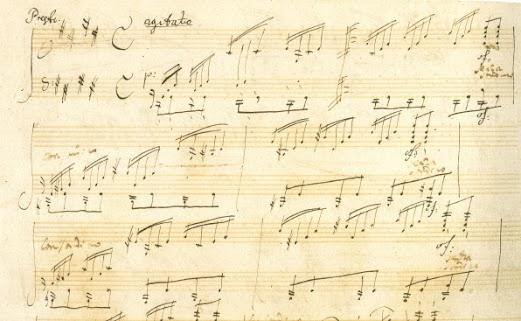Piano Sonata No. 14
Ludwig van Beethoven
AKA "Moonlight"
Copyright © 2022
By Ralph F. Couey
I've been around classical music for most of my life, introduced to by my father who was a big fan of Beethoven. This was the music we listened to, at least until the Beatles showed up. Later on, my activities in band and orchestra through high school and college provided exposure to the genre through the performance side. There have been several pieces that I still enjoy listening to, such as Beethoven's 5th and 9th, Holst's "The Planets," Kachaturian's "Gayne Ballet Suite," and the last 5 minutes of Mahler's "Resurrection" particularly the performance of the Simon Bolivar Youth Symphony conducted by Gustavo Dudamel (Resurrection Proms) at the 2011 BBC Proms, a concert series featuring youth symphonies and choirs. I never tire of listening to the beauty and power of that orchestra and choir putting forth with that special energy that uniquely belongs to the young. And the audience responding in kind with a long, cheering, ovation. Towards the end, the mezzo soprano Anna Larssen, is trying to keep her emotions under control, at one point, clenching her fist. But by the end, she is openly in tears. It never fails to move me. But that's what great music is supposed to do, to reach into the soul and change you.
In 1801, Ludwig van Beethoven wrote a three-movement piece he called "Quasi una fantasia" (like a fantasy). A year later, he dedicated the composition to he pupil, the Countess Giulietta Guicciardi. The Countess was, by all accounts, a great beauty and through the time he taught her, he fell in love. He later wrote a 10-page love letter (never sent) the inspiration of which some historians attribute to the Countess.
In structure, the piece is a subdued melody articulated by seemingly endless arpeggios. It is played quietly; reflectively. Variations in tempo enhance the passion written into the phrases. "Moonlight," the sobriquet it is universally known by, was actually attributed to the piece five years after Beethoven's death by a critic and poet Ludwig Rellstab. He described the first movement as moonlight shining on Lake Lucerne in Central Switzerland. Within 10 years, it was known by almost everyone as the Moonlight Sonata.
Moonlight had a powerful effect on listeners, and continues to have today. French composer Hector Berlioz described it as "one of those poems that human language does not know how to qualify."

